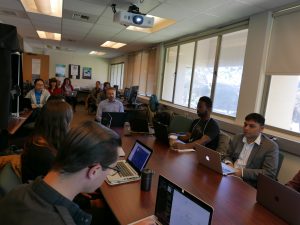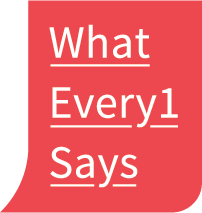The Mellon Foundation funded WhatEvery1Says project (WE1S) held the first in its series of workshops on January 26, 2018, at UC Santa Barbara. The three-hour workshop on “Markdown & Github: First Steps Toward learning Modern Digital Practices for Sustainable and Shareable Research” was led by WE1S co-PI Scott Kleinman. Preparatory steps for participating, slides and resources, and a full video recording (showing all slides and exercises with narration) are available online.
Video: 1. Participant Intros (12:53) | 2. Workshop Intro (14:54) | 3. Markdown (1:21:56) | 4. GitHub (1:10:30)
WE1S designed the workshop (original publicity announcement) to train its research assistants at UCSB, CSUN (California State University, Northridge), and University of Miami in its basic publication workflow of (1) creating documents in Markdown, (2) depositing in GitHub, (3) and then flowing materials into other formats, including posts in HTML on the project WordPress site. More generally, the workshop emphasized the underlying rationale for such a workflow in the context of open and reproducible research. The question the workshop sought to answer was: How can research results be designed from the get-go to be flowed easily between platforms and formats, now and in the future?

A surprising variety of UCSB faculty and graduate students from outside the WE1S project—including from the fields of history, writing studies, and statistics—attended the workshop. In posting workshop materials and recordings online, WE1S invites even broader research and student communities to learn from its training activities.
- Markdown is a plain text format for writing structured documents. First developed in 2004, Markdown is gaining in popularity because it is easy to write and read, as well as to create consistent formatting that can be rendered in a wide variety of formats and environments, including GitHub.
- GitHub is a Web-based document and code repository hosting service that provides extensive version control functions and features designed for collaboration. Widely used for computer code, GitHub is becoming increasingly popular with humanities scholars needing these features, and even for hosting blogs and websites.
Across the disciplines, including in the social sciences and humanities, researchers are using these tools to create research environments that enable the maintenance of stable, easy-to-migrate documents, the clear versioning of their work, and the ability to contribute to and draw from shared-project resources.


